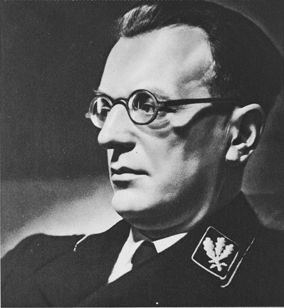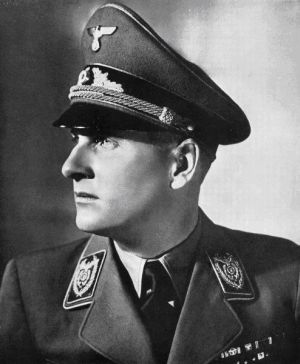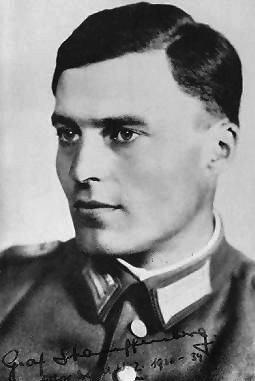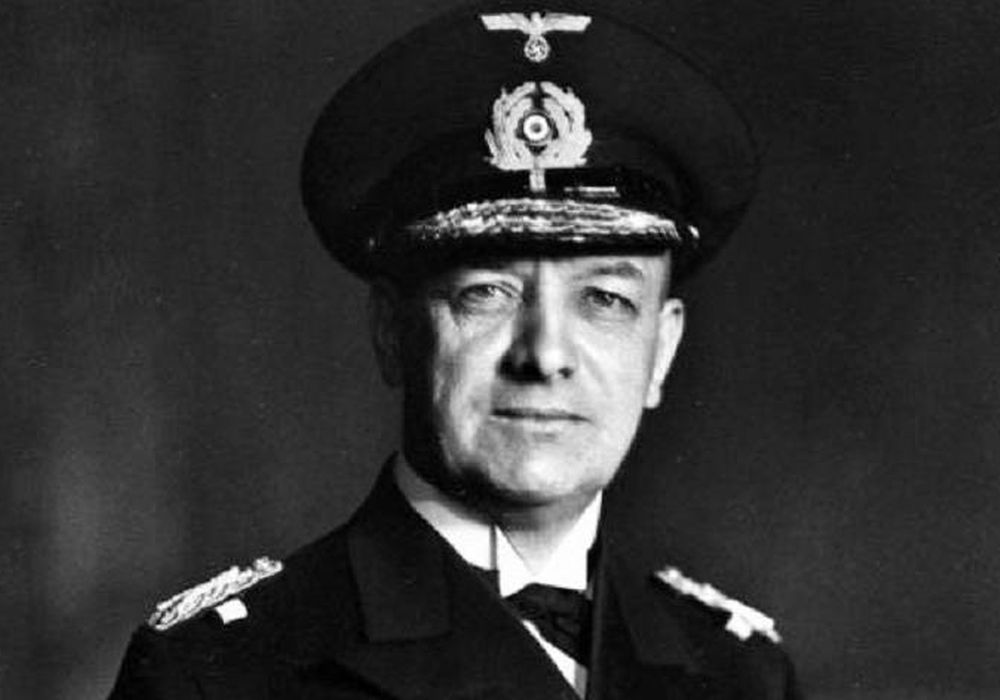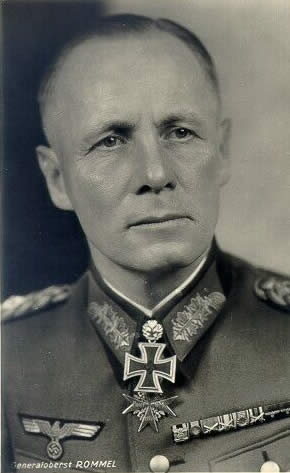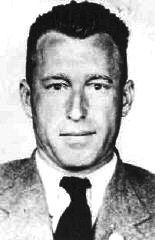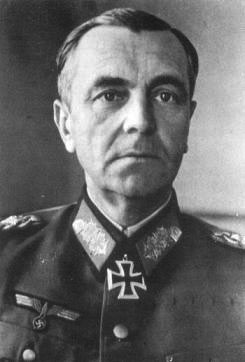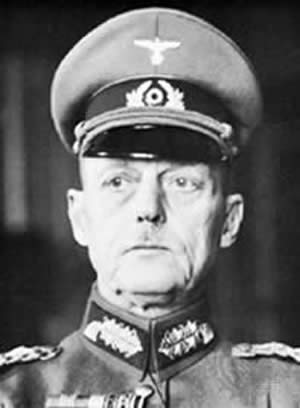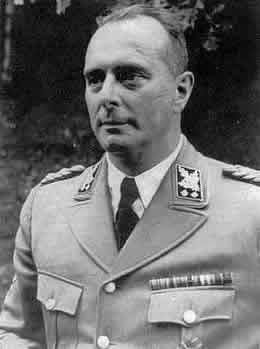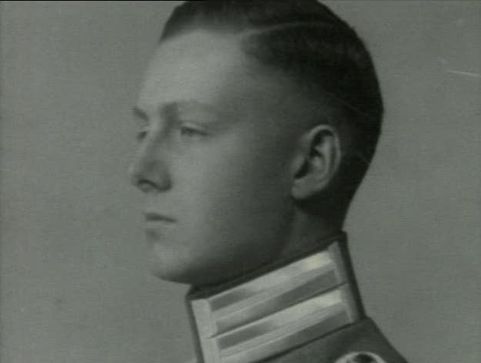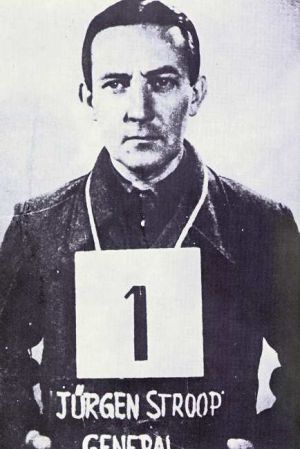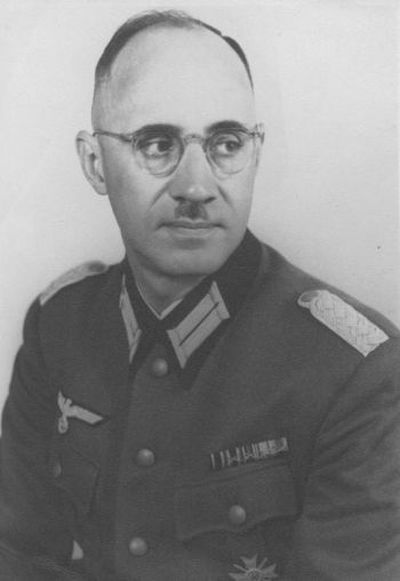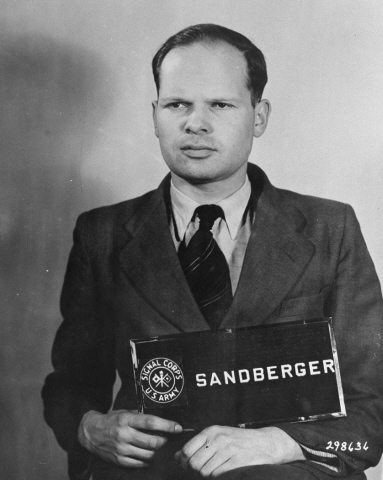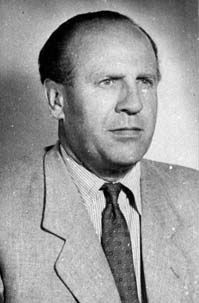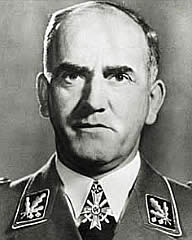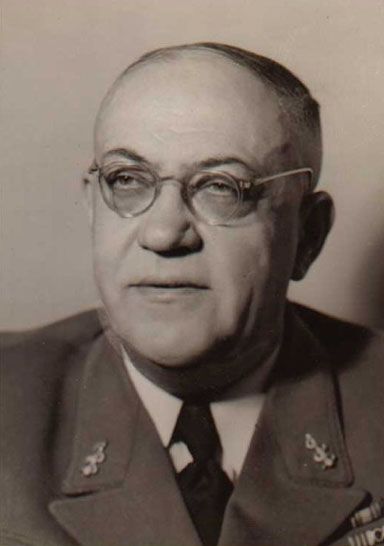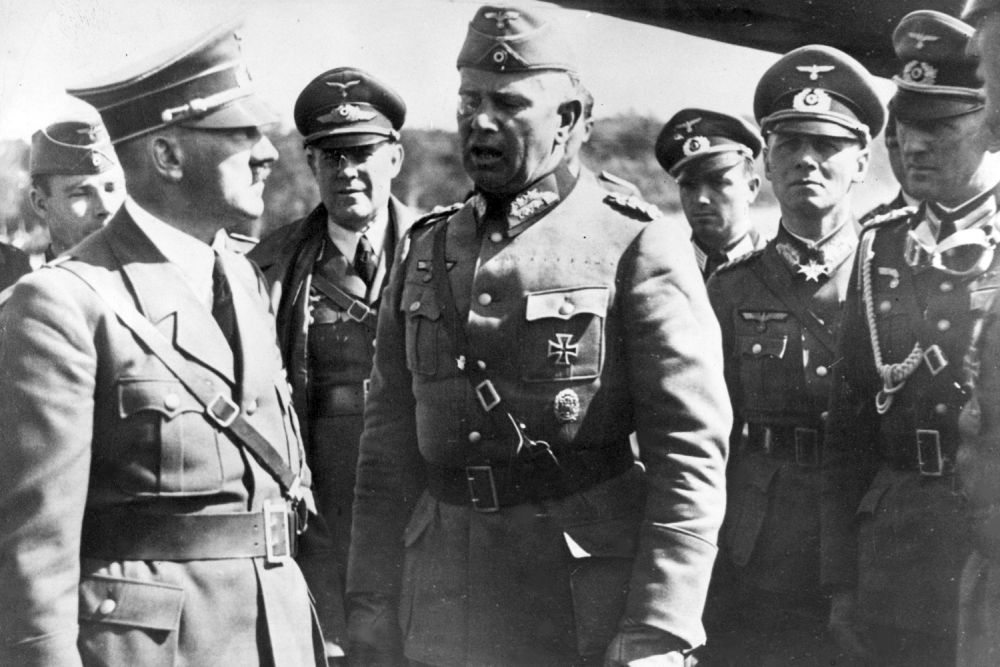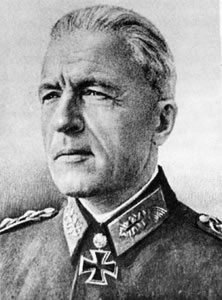Articles
- Article by Kevin Prenger
- Published on September 1st, 2012
Arthur Seyss-Inquart
Arthur Seyss-Inquart is best known as Reich Commissioner for the occupied Netherlands. Prior to holding the function of the highest representative of the occupying forces in the Netherlands, from 1940 to 1945, he also held an important position in Austria and Poland, within the national socialistic government. In Austria, he had an important role in the unification of that country with Germany in 1938, the so called Anschluss (connection).
- Article by Bob Erinkveld
- Published on May 30th, 2016
Baldur von Schirach
Baldur Benedict von Schirach was born May 9th, 1907 in Berlin. His father was Karl von Schirach and his mother Emma Middleton Lynah Tillou, an American. Baldur had two sisters, Viktoria and Rosalind and an elder brother, Karl Benedict who had committed suicide in 1919, 19 years of age. As the son of a Prussian theatremanger, Baldur grew up in an aristocratic environment. Much attention was paid to music, theatre and literature. He showed his talents as a poet at an early age. Because of the American heritage of the Von Schirach family, English was the first language Baldur learned to speak. Only from his fifth year onwards he mastered the German language a little.
- Article by Auke de Vlieger
- Published on December 2nd, 2016
Claus Schenk Graf von Stauffenberg
Claus Philipp Maria Schenk Graf von Stauffenberg was born November 15th 1907 in Jettingen, Bavaria, the youngest of three sons. His twin brother Konrad died one day after birth. The elder brothers Berthold and Alexander were twins as well. The Von Stauffenberg family stemmed from an aristocratic, 800 years old Schwabian lineage of prominent nobility. Claus’ father, Alfred Schenk Graf von Stauffenberg was a Major in the Cavalry, Commander in the Order of the Holy Joris and the last lord chamberlain of the King of Württemberg. Afterwards he became chairman of the revenue office until his retirement in 1928. Carolina, Gräfin Schenk von Stauffenberg had been lady in waiting of the Queen of Württemberg. Claus’ great-great-grandfather was the famous Generalfeldmarschall Von Gneisenau, one of the heroes of the time of Napoleon and co-founder of the Prussian General Staff. Claus was also a relative of Generalfeldmarschall Graf York von Wartenburg, a celebrity from the war against Napoleon as well.
- Article by Wilco Vermeer
- Published on January 8th, 2016
Erich Raeder
Erich Raeder, born in 1876, entered service with the Imperial German Navy in 1894. Until during the First World War he held operational positions. Later he served in several staff functions and in 1928 was made head of the German Navy. Raeder retired on January 30th, 1943. After the Second World War het was sentenced to life imprisonment for his part in the war.Beceause of health reasons he was released in 1955. In 1960 Erich Raeder passed away.
- Article by Frank van der Drift
- Published on October 6th, 2016
Erwin Rommel
Erwin Johannes Eugen Rommel was born November 15th ,1891 in Heidenheim/Brenz near Ulm. His father was a teacher and his mother was the daughter of a former prime minister of Württenberg. Although it was Rommel’s dream to enter the world of mechanics, he joined the army at the local military unit, the 124th Infantry Regiment (6 Württemberg) as a cadet in July 1910. Erwin rose through the ranks quickly and in March 1911, he was allowed to attend the officer’s school in Danzig (Gdansk). He graduated in 1912 and returned to his infantry regiment in Weingarten as an officer. During his education in Danzig he met his future wife, Lucie Maria Mollin. Until the beginning of World War One, Rommel was regimental officer at the training department.
- Article by Robert Jan Noks
- Published on October 12th, 2017
Franz Stangl
Franz Stangl is seen by many as the role model of the loyal and obedient police officer in any circumstance. Because of his upbringing in an authoritarian family and an education where blind obedience came first, he has carried out his tasks with meticulous dedication to which many hundreds of thousands have fallen victim. The life of Stangl was one of an inconspicuous civil servant who became a conscious cog in the machinery of the Holocaust.
- Article by Auke de Vlieger
- Published on October 29th, 2016
Friedrich Paulus
Friedrich Wilhelm Ernst Paulus was born September 23rd. 1890 in Breitenau, Hessen. His father was employed as a bookkeeper in a correctional institution. The family was not of noble descent, hence the family name did not include ‘von’ as is often assumed incorrectly.
- Article by Tom Notten
- Published on October 8th, 2016
Gerd von Rundstedt
Karl Rudolph Gerd von Rundstedt was born December 12th 1875 in Aschesleben in the Harz mountains near Magdeburg. He came from a military family dating back to the 12th century. When Gerd was born, his father served in a Prussian regiment of Hussars in the rank of Lieutenant. His mother was the daughter of a real estate owner.
- Article by Kevin Prenger
- Published on February 20th, 2013
Hanns Rauter
If one person could be associated with Nazi terror during the occupation of the Netherlands, it would be Hanns Rauter, the Höhere SS- und Polizeiführer and General Commissioner of security in the Netherlands. As the representative of SS-leader Heinrich Himmler, he was responsible for repressing the resistance, amongst other things, and he supervised the deportation of Jews. He was generally feared by the Dutch people and considered a symbol of oppression and terror.
- Article by Matthias Ouwejan
- Published on July 18th, 2017
Henning von Tresckow
Henning Hermann Robert Karl von Tresckow was born January 10, 1901 in Magdeburg (today in Sachsen-Anhalt), a descendant of Preussian nobility. Many of his forebears had been officers in the Preußian army and Henning also wanted to join the army badly. On August 13, 1917, he was posted to 1. Garde-regiment zu Fuß in Potsdam where he started his training. After graduation, he was sent to the western front in France in the spring of 1918 and was promoted to Leutnant in August. After the First World War had come to an end, Von Tresckow joined the 9. Preußische Infanterie-Regiment where he was considered a very ambitious man with a bright future ahead of him. Nevertheless, he decided to focus on a career outside the army which he left at the end of October 1920 to enroll as a law student at the Friedrich-Wilhelm University in Berlin. A year later, Von Tresckow continued his studies in Kiel but never graduated. In 1923 he started work at the Wilhelm Kann Bank in Berlin and with his intelligence and cold-bloodedness, he managed to make a lot of money on the stock market. He possessed a very convincing personality and combined this with gallantry and the readiness to discuss anything. This left a strong impression on many people. In 1924, Von Tresckow made a world wide tour through countries in Europe and North and South America which was quite a privilege in those days. Thereafter, Von Tresckow went into business.
- Article by Kevin Prenger
- Published on March 20th, 2018
Jürgen Stroop
During World War Two, Jürgen Stroop was involved in the suppression of civilian revolt, the fighting against partisans and the persecution of Jews in Czechoslovakia, the Soviet Union, Poland and Greece. He became most notorious by his role as leader of the suppression of the uprising in the Warsaw ghetto in the spring of 1943. Stroop was known among his colleagues as a ruthless brute. He was loyal to Heinrich Himmler (Bio Himmler) and followed his orders with total devotion.
- Article by Kevin Prenger
- Published on September 10th, 2018
Karl Plagge
As a commander of a Wehrmacht unit in Vilnius, which occupied itself with the repair and maintenance of army vehicles, Karl Plagge took over 1,000 Jews in protection. Thanks to him, some 200 of them survived the war. In 2005, he was honored posthumously by Yad Vashem, the Israelian Holocaust Institute. Major Plagge is now known as Righteous among the Peoples, just like Oskar Schindler.
- Article by Kevin Prenger
- Published on January 19th, 2017
Martin Sandberger
While the attention of the international media was focused on the trial against camp guard Ivan Demjanjuk in May 2010, another Nazi war criminal died that year who had been living a comfortable life for decades. He had never gone into hiding in South-America, was not registered on any wanted list, even that of Simon Wiesenthal and could easily be found in the telephone directory. He sure had been sentenced, even to death. His death sentence, imposed on him in April 1948 may have been changed to life imprisonment but his release followed as soon as seven years later.
- Article by Kevin Prenger
- Published on August 6th, 2017
Oskar Schindler
The person of Oskar Schindler was made famous by Steven Spielberg’s movie Schindler’s List from 1993. The Sudeten-German evolved into a symbol of humanity and courage because he, in his position as a succesful business man during World War Two, had saved the lives of almost 1,100 Jews who were employed by him in his factory. For this, Yad Vashem, the Israelian Holocaust Memorial Center awarded him the title Righteous among the Peoples, an important decoration that is awarded to non-Jews having saved Jews from the Nazis.
- Article by Kevin Prenger
- Published on October 4th, 2017
Oswald Pohl
Oswald Pohl was born June 30, 1892 in Duisburg-Ruhrort, Germany, the fifth child of blacksmith Otto Emil Pohl and his wife Auguste Pohl-Seiffert. He attended elementary school in Duisburg-Laar from 1898 to 1904. Subsequently he attended the Real gymnasium in Duisburg-Hamborn for seven years. In his own words, he was a rather good pupil and took his diploma at the age of 20. On April 1, 1912 he embarked on a career in the German Kriegsmarine. His training took place in Wilhelmshafen and Kiel as well as in the Pacific. During World War One he was stationed on the Flemish coast and sailed on the Baltic Sea for some time.
- Article by Arnold Palthe
- Published on June 16th, 2016
Theodor Morell
Theodor Gilbert Morell was born July 22nd, 1886 in Trais-Münzenberg in Hessen. He was almost three years older than his future, famous patient Adolf Hitler. His father was a teacher at a primary school, his mother came from a prosperous agricultural family from Hessen. Theodor had an elder brother Adolf and a younger sister Emilie. Adolf died of a stroke on November 1944 at the age of 61.
- Article by Wilco Vermeer
- Published on February 8th, 2017
Walther von Reichenau
Walther von Reichenau was a confidant of Adolf Hitler and had responsibility in the assacianation of Ernst Röhm and the deminishing of the SA during the Night of the long Knives". In 1940 he was promoted to Generalfeldmarschall and was also responsible for many warcrimes committed at the Easter front by military under his command. He became seriously ill in January 1942 and deid on his way to a hospital in Leipzig.
- Article by Auke de Vlieger
- Published on December 15th, 2016
Walther von Seydlitz-Kurzbach
Walther Kurt von Seydlitz-Kurzbach was born August 22nd, 1888 in Eppendorff-Hamburg. He descended from Prussian military nobility and was a direct descendant of the famous Prussian general Friedrich Wilhelm Freiherr von Seydlitz. In 1908, Walther joined Feldartillerie-Regiment 36 as Fahnenjunker (cadet). He was promoted to Leutnant in 1910.
